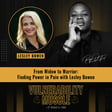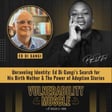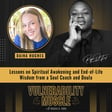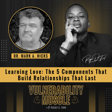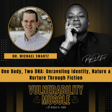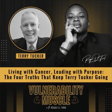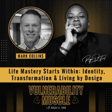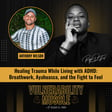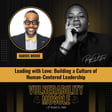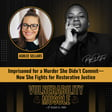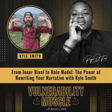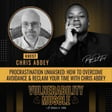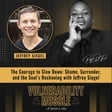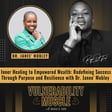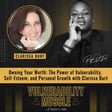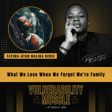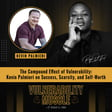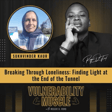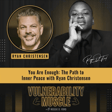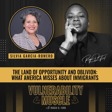Working out of Necessity vs. Passion
00:00:01
Speaker
when you're not operating your purpose, you're going, you're not going to do what is necessary or what is required. It's a difference in working out because you have to versus working out because you're passionate about it. True.
Introduction and Podcast Context
00:00:13
Speaker
Welcome to Vulnerability Muscle, the inspiring podcast challenging norms and helping you redefine vulnerability as a strength. I'm your host, Reggie D. Ford. Each episode of Vulnerability Muscle dives into a variety of topics such as mental health, social issues, and mindset shifts.
00:00:31
Speaker
We explore the power of vulnerability and fostering meaningful connections. healing, building resilience, and promoting personal growth. Sometimes these conversations are uncomfortable, but good workouts often are.
00:00:46
Speaker
So join us and flex that vulnerability muscle. Welcome to this episode of Vulnerability Muscle. I'm your host, Reggie D. Ford.
Introducing Dr. Haskins
00:00:55
Speaker
And today I got a friend, a brother with me, Dr. Brandon Haskins. Yes, sir.
00:01:00
Speaker
I'm going to read this bio because it's just, I mean, I got highlight my brother, man. Dr. Brandon P. Haskins is a dedicated educator, consultant, and advocate for student success. As the founder of Branded Consultant, Dr. Haskins leverages Expertise in student engagement, leadership development, and success coaching to empower individuals and organizations.
00:01:22
Speaker
With a background in higher education, student leadership and development, and mental health advocacy, Dr. Haskins is committed to fostering belonging, resilience, and growth. Let's go. Let's go. A proud leader, educator, and mentor for over a decade, Dr. Haskins is a champion for student success and community impact Yes. That's good dude. It sounds like a great dude. It sounds like a dude we need in front of our students.
Gratitude and Personal Updates
00:01:47
Speaker
Yeah. Leading people, leading people who are leading our students. Yes. Like, oh, man. how you how How's your heart today, man?
00:01:54
Speaker
Man, my heart is grateful. um I woke up in a very gratitude position. Yeah. I don't know if I told you, but we're expecting our third child. Congrats.
00:02:05
Speaker
So I'm in a very weird space, but it's like, okay. Yeah. It's been eight years since we opened the shop back up. Wow. We're having our third one. So that ah it'll be a big gap, but I'm very grateful, man. New life, new career.
00:02:22
Speaker
um Man. ah keep me yeah It'll keep you young, too. Absolutely. I realize I'll have college students in my house for the rest of life. Right. So I'll be 50, you know, feeding college students. That's what's That's something I look forward to. so That's beautiful to hear. yeah That's beautiful hear because, like, I mean, like, just knowing you and the family man that you are and the heart that you give, you're going to pour into all the kids. yeah let him Oh, man. yeah That's beautiful. That's my goal.
Vulnerability and Childhood Memories
00:02:47
Speaker
yeah yeah Before we dive deeper into your story, I want to do a segment we call What Comes to Mind.
00:02:52
Speaker
Okay. and So you tell me what the first thing you think of is, and got three questions. Okay. It be simple, but let's go. What comes to mind when you hear the word vulnerability? Open heart.
00:03:04
Speaker
Let's go. I like that. Yeah. Okay. Yeah. What is something you do to relax if you're feeling stressed or overwhelmed? ah if ah This is going to be weird and different. If I feel stressed and overwhelmed, I like to go out with people.
00:03:20
Speaker
Okay. People engagement is one of my, it's something that gets me calm and keeps me going. Yeah. I don't know. I'm a people guy, so I like to around. Why'd you say that would be weird?
00:03:31
Speaker
Because most people, when you hear, like, what's something you do to calm down, it's like isolation. And I'm like, no, I don't want to be isolated. Put me in with the people. Even if I just go and sit around a bunch of strangers, like, I'll still feel... Coffee shop yeah type of stuff. yeahp I like that. No, I think i think that speaks... You're extrovert, I'm assuming. Absolutely. So I think that speaks to that. Like, it sounds like, for me, I'm i'm an introvert. And so my time, and we talked about it, my time is like, I'm isolated.
00:03:59
Speaker
um um Even from family, like, I don't want to hear nothing. I just want to be in nature. I want to walk the dog and hear the birds chirping. But, like, that's good to know. Like, it's good to know about yourself, too, and then be able to communicate to people. So it's
Graduation and Freedom
00:04:13
Speaker
And the last one, you may have to think a little bit on this one, but what is one of your favorite childhood memories? Whoa. Wow. Wow.
00:04:25
Speaker
ah I cannot stand you Reggie Childhood Let's think on good Okay One of my favorite childhood memories Oh Mmm
00:04:38
Speaker
I would say one of my favorite childhood memories, doesn't matter at the age. No. ah So I think one of my favorite childhood memories was graduating high school. Okay. yeah So you were 17 when you graduated high school? Yep.
00:04:49
Speaker
Okay. I was good. I was good. was like, wait, we need under 18. There has to be a... Okay. no Yeah, I was 17. But I think my senior year was like one of the best years of my entire childhood. Wow.
00:05:03
Speaker
it compensated for all the pain and the struggle that I went through. And it gave me that platform, that sounding board to just jump off. And I became my own man after that. So I came to Nashville that, that, ah that summer, um, went to Tennessee state university. I never looked back. So for me, it was like putting in the past behind me and really just taking that next step to life. So, yeah, yeah. Now that I'm in my adult phase, I'm a father, you know, 30, 31, be 33 in July.
00:05:34
Speaker
had to go back and unpack the childhood. But I think the best moment of my childhood was graduating high school. That's dope. That's a huge moment. yeah That's a huge moment. Like I remember my graduation and it was like, it was a proud moment because i want to say like, it was one of the first moments for me where my family really like the
Childhood Struggles and Self-Love
00:05:55
Speaker
extended family too,
00:05:56
Speaker
got to come on campus at yeah NBA at Montgomery Bell Academy, which was worlds away from where they knew knew about and where I grew up. yeah And it was just like, okay, we all up here. I had my 2009 glasses on. I was like, it was it was it was a fun time. So man, graduation is a beautiful time year. So yeah I'm curious. And if you, if you said open heart, like that that that's what vulnerability means to you. is is Do you feel like opening your heart a little bit today?
00:06:24
Speaker
I don't mind. You don't mind? So I think it's negativity bias is real, right? And we all deal with it. It's like the the the survival um mechanism that makes us remember the negative things more than the positive things. it's like So when I asked you that question about your favorite childhood memory, you were like, all right, let's focus on good. What was coming up for you?
00:06:47
Speaker
On the opposite side of that? Yeah. oh the memories of actually being a kid and wanting to just be a kid and couldn't be the kid.
00:06:57
Speaker
So um realizing like all of the hurdles that a kid should not have to go through. right And for me, even though there were good moments,
00:07:09
Speaker
the The bad outweighed the good. And so for me, it was like, oh, that could be, oh, no, that couldn't be, oh, that could be, oh, no, that can't be. And so it's like, ah what was something that I didn't have to work too hard for but was actually a really good moment in my life that I could really just say?
00:07:26
Speaker
This was freedom, like, liberating. Like, had no I no—I didn't care who was there. I didn't care. i had promises of people showing up to graduation, but i didn't care. was—that was the one time in my life, in my childhood, that I could say I was like, man. Yeah.
00:07:40
Speaker
Yeah. I feel good. Like, I love who I am. I love who I'm becoming. And so let's move on. So, but for me, it was a lot of the hurdles that I had to jump over just being a kid. Yeah. That sucks. Yeah. so Yeah.
00:07:53
Speaker
Having to grow up so fast and sounds like there was some, some performative love that was received. Like i have to achieve to be loved or feel that. And, And, like, i I know that so well. Yeah.
00:08:06
Speaker
And unfortunately, yeah. Or even having to prove it to yourself that you can do it because you don't have nobody there to encourage you and tell you that you can do it. That was one of the biggest struggles that I faced was, like, that self-efficacy piece, like,
TSU Experience and Leadership
00:08:22
Speaker
you can do this. But realizing, like, man, I'm in the thick of it. And it's it's interesting that I'm being vulnerable in this moment that when I go back and talk to my when I'm thinking about when I'm talking to my daughter, you know, about certain things in class like she didn't have what she has. I didn't have. yeah So it's just so, and not just my daughter, my son as well. Like when we're going over problems, math problems or reading books, like I didn't have a parent to tell me, hey, you need to go do this or, hey, you need to pay attention in class or, hey, let me help you learn this math. as I didn't have that. So growing up, I had to learn to get it on my own. And that just was, that's not, I don't think kids should, that's not fair to kids. No, that's real. That's real. Like, I mean, we we we have basic needs and I think that guidance and that nurturing is a basic need that we all have. And so, um but you, like, I think in in even hearing you think back through some of the memories of like,
00:09:19
Speaker
I could start here. Oh, nope. And then there's good and bad. There's duality to a lot of those memories. And there's some resilience that has been built in you. and it And it carries you to Tennessee State University. Like, shout out. Let's go. love my alma mater. The land of golden sunshine. Hey, let's go. Tell me about tell me about what that, because high school was a rebirth and knowing who you were, loving who you were. yeah What did it feel like to step foot on campus and what was TSU like? Okay, so the backstory to stepping foot on campus at TSU, I went to their summer camp at TSU, Organization of Black Airline Pilots, OBAP.
00:09:56
Speaker
And I wanted to be a private private pilot. ah They took us there in eighth grade. or was a I think it was eighth grade. They took us there. We did a summer camp, and I got bit by a spider in the apartment. Oh. So I always say, like, I'm like Spider-Man, right? Right.
00:10:11
Speaker
I got bit by the bug. And it was a big, big wep on my thigh, man. And I remember that vividly. I remember going to the campus. First of all, when you arrived at TSU's campus, if you've never been to 3500 Johnny Mary Boulevard, it's beautiful, dog. like when Especially when the sun is shining, it hits right above the campus, the heart of the campus. That's why the land of golden sunshine. You walk on the campus, the greenery, it was just...
00:10:36
Speaker
It was like I went to see the Wiz. It was very beautiful. um But that was the most impactful moment in my upbringing. And I remember, man, when I stepped foot on the campus that summer going into my freshman year, bro, I was like, I've arrived. it's Like, let's do this. I had a sense of empowerment, a a sense of just like pride.
00:10:58
Speaker
everybody disliked me because I was so extroverted and was like, I'm the spirit leader, yeah I'm doing all the chants, I'm getting all my classmates. um And so funny thing was, at the time, well, I didn't know she was there, but at the time,
00:11:14
Speaker
My wife, who was just a freshman as well, she was like, I did not like you. was just so extra. I remember you. You was leading all the chance. You was trying to get us and direct us. and was like, who is this person?
00:11:25
Speaker
I thought you were upperclassman. I was like, wow no, I was just excited to be that's what's up in my purpose, being where I was supposed to be. And from that moment on, I transcended like a butterfly, bro. Man.
00:11:37
Speaker
It was so beautiful. Like the experience at Tennessee State University was like none other. Yeah. And I appreciate it. It it grew me. stretched me. it It developed me. And I believe a lot of who I am today is because of the experience that I had at TSU, not just in undergrad, but when I got my master's and when I started working there professionally, all those years that I have at on that campus created who you're looking at today. Let's go. Yeah.
00:12:03
Speaker
as Aside with God, you know, of course, you don't have to, yeah my super spiritual saints. But I really do appreciate what i what i learned there. was great. It was a great time. Oh, that's beautiful, man. I can feel it. Like, I can feel the energy and understand. And like, that's funny, though, that your wife was like, nah, I didn't like you at the time. Nah, did not like you. It was so funny. I was like, why?
00:12:25
Speaker
And I, you know, when you're when you're going back and listening to, or rethinking, rehashing out the past, you're like, I don't even remember seeing you. Yeah. And I was like, how why don how did you have an opinion about me when I don't even remember you? I didn't even know who you were. I was just doing all that.
00:12:41
Speaker
And I was. If anybody, everybody that knew me and still knows me. No, in rephrase that. was Everybody knew me. oh yeah keyor Everybody knew me. ah Everybody was like, yo, they can count on me to leave the chance. I was always the first one Hey, gang, and i was always the the first one, like, just leave my peers. That's what's up.
00:13:01
Speaker
And it was a good it was for good thing, good cause, but ultimately I graduated. Yeah, you know yeah so that's that's
Passion vs. Profession Outcomes
00:13:08
Speaker
important. um And I received my—so my terminal degree is from Chevecca. So my doctor's from Chevecca Nazarene, but I went to TSU for my bachelor's and my master's. And were you always studying to for education, like to to become the doctor that you were? Did you know that? No. So funny funny thing was I remember watching Lean on Me in high school, yeah and I said I want to be a Joe Clark.
00:13:30
Speaker
And that was like— Because now I can't even see that movie the same. Because you know the voiceover, the dude from Memphis who does the voiceovers? and He does so many voiceovers of that movie. I don't know what his name is, but funny man out there who does the voiceovers, a wing on me. Man, I can't even think of that movie the same. But go ahead. I love that. I love that movie, man. But it it played on my heart string of providing students a safe space. yeah And I'll never forget, um in high school, I was part of DECA, which is a marketing association for high school students. So you learn all the ins and outs of marketing. You go to national competitions, pitching, business ideas, things of that nature.
00:14:12
Speaker
So I was a part of that. And then I was also a part of minority teacher recruitment. And so that was ah ah another program that actually afforded me to come to TSU because I ended up not taking the aviation route. um But I ended up, so I came to, see well, MTRP gave me, they awarded me $20,000 scholarship.
00:14:30
Speaker
um And so I got that to come to TSU Mm-hmm. 20,000. It was beautiful because that was 20,000 over four years. um And so I had that scholarship and I was going to come for education, but then I was like, I don't know, my heart is really into theater. Like that's, you know, where my passion was. So I started off hitting the ground running as a theater major.
00:14:50
Speaker
And I had one conversation with my great aunt and she was like, you ain't going make no money. You're going to up homeless sleeping in your car. And that scared the crap out of me because here I am, was i family adopted, growing up in in and in a family adopted home. And I'm like, anything that resembles that struggle, I'm good. So as soon as she told me that, i ran out of the masksco I ran out of the theater department. I changed my major that semester to mass communication.
00:15:16
Speaker
But for some reason, it still didn't feel complete. But I did it because it still allowed me a career path. Yeah. um And it still gave me utilize those theatrical abilities that I had. So the career path at that time was to have my own radio talk show. Okay. So I started off with that. can say that. Yeah. if We had ah a gospel radio a show called The Altar Call. we We had that. And then I was just doing a lot of the ah news broadcasting on campus. So that was cool. So I was still, you know, doing things. But I realized and my senior year, it's like I did all of that.
00:15:49
Speaker
And I don't have a job lined up. And that reality set in so fast. um Because I graduated in May and went to K&G the next day. And that's where was working for another year. Which is fashion. Fashion. Retail. Yeah, retail. And I was like, this dude with a bachelor's degree from Louisville, Kentucky.
00:16:10
Speaker
High in his class. But you're working at. Man. Man. So I realized that there was a lot of things that I missed. I didn't utilize all of the opportunities that were there. i I couldn't blame TSU because they set me up and they gave me the foundation, but...
00:16:25
Speaker
You was busy cheering. No. Yeah, yeah, yeah. And I played. I did a lot of stuff. But I also, when you're not operating your purpose, you're not going to do what is necessary or what is required. It's a difference in working out because you have to versus working out because you're passionate about it. True. Right? And so I was in that phase of, like, I got to get through this class. So I'm going just do the bare minimum to knock off, to get my grades, make sure I'm maintaining my GPA, keep my scholarship.
00:16:54
Speaker
But in comparison to the person that was actually there in purpose, they're doing the internships. They have their acting reel. They have their reels. They have everything that they need, the package that they need to graduate.
00:17:06
Speaker
I didn't have a package. Wow. So I realized ultimately, Brandon, you're not in your field where God called you to be. So what you going to do about that? Wow. So I went to the drawing on board. You were you were at KNG. Because there's there's overlap in our stories. Because one, when you got introduced in the eighth grade to TSU's campus, it was like, you got bit by the bug. And like yeah you were you were like, oh, man, this opened my eyes yeah to a beautiful campus, a beautiful place to go.
00:17:32
Speaker
And that that's similar. like I was 10 years old and got to play in an All-Star game at Vanderbilt. And I got to meet players. I got to you know tour the campus. And it was like... Oh, like, ah, like yeah when those young moments, when you don't get those experiences often, like they have a huge imprint on who you become.
00:17:50
Speaker
And then fast forward, like I was the same. I studied econ, but got to my senior year. didn't have, I'm like, bro. I got a great GPA. I've got extra career. I've done a lot of stuff, but yet like the the opportunities weren't there. yeah And so it led me back to school, and it sounds like ye that was part of the when you went back to the drawing board.
Transition to Higher Education and Family
00:18:10
Speaker
Yeah, I went back to the drawing board because I said, well, mind you, we just got heed just got married. So in the process, I met my wife.
00:18:17
Speaker
When did she switch from not liking you to liking you to then saying yeah You know, I'm going to just be real, and she going to see this. I think she liked me. That's why she said that. But, you know, let her tell it. i I stalked her. Let her tell it. I chased her down, which I did chase her at some point. But, you know, October 10th, 2011, she said, yeah, I'll be your girlfriend. So it was it was a beautiful moment. We have a really, really good bond. Yeah.
00:18:45
Speaker
Meeting her, and then we got married right after we graduated. So that was beautiful. She was in the same major, same class. So I believe there was a reason why I switched my major to Mazzcom, because we ended up taking appreciation of drama together. and that was when I became a fact infatuated with her, and it was just like, wow, she was acting as Wendy Williams.
00:19:03
Speaker
But anywho, enough about that. you know We can talk about that later. But i I realized like, okay, wait, we're married. There's what's, what's going on? Because I can't, KG, like no shade to anybody that works in retail, but I just have a different type of ambition and motivation behind me. So this, this wasn't the end of me, the end of my story. So I went back to the drawing board and that's when I said, okay, all right.
00:19:30
Speaker
Let's do it. Education. So I went back, got my master's of education. And at the time, i was I was confused because I didn't know if I wanted to do K-12. Then you also, I was introduced to the world of higher education. So I'm like, I don't really know which route to go. So it sounds like it's better to take the higher education route. K-12 seems a little bit more difficult. I got to go back get some certifications. Got to go do all these things. And I just...
00:19:54
Speaker
I don't think I was asked committed to education to go back to do that. So okay I went the higher ed route, um and that's when I landed my first gig at TSU in 2015. And so from that moment on, like I was at TSU in higher education, still leading chance. But I was the professional now. I was on the opposite side of the field and just leading students to their success. So coaching students and helping them – Helping them not to make those same mistakes that I made, you know, and then helping them overcome those barriers that do come do come and their arise. And so that's where, you know, that student engagement and success and retention, all of that came
Student Engagement and Belonging
00:20:31
Speaker
into play. Yeah. What were some of those barriers that you noticed with some with your own story, but then with some of the students that you worked with as well?
00:20:38
Speaker
So persistence is of is one of the biggest things. like It's like working out, right? You're working out. you don't you own you're you on that You're in that second set, and you're on that third rep, and you have to get to 12, and you're starting to feel that burn because it's different than when you did the first set, but that second set. I always tell people, if you can get through that second set,
00:21:00
Speaker
You good. Because then that last set, it's just, you will is it you got to get it out. yeah But that second set and you're that third rep and you feel that resistance. But it's like it's in that moment that your muscles are actually really doing what they need to do to develop and strengthen. So what what if you kept going?
00:21:18
Speaker
Mm-hmm. What if you kept going? yeah You will appreciate it in the end. And that persistence is what students face. ah Like the that struggle, that ambiguity in their mind saying, you know, I feel this resistance. I don't know if this is if I'm doing the right thing.
00:21:34
Speaker
You know, me my professors, we're butting heads. This paper, that they're asking me to write a 10-page paper for something I'll never use again in my life. But what if you just did it? yeah What if you utilized the resources that was right in front of you that you knew nothing about because you was just so laser focused?
00:21:51
Speaker
But what if you just did it? yeah But most students can't get there because they don't have nobody there in front of them pushing them. And so that was what my role was, being a first year first ah first-time freshman coach for those students that have never been introduced to college. Yeah.
00:22:07
Speaker
Their family. Yeah. Their biological mom and dad did not graduate from an institution. Right. So for reference, like TSU is a HBCU, you historically back black college and university. And so that that comes with families who may not have had that experience to lead them that way. And so to have somebody like you on campus coaching, oh, that's beautiful.
00:22:27
Speaker
And there were there were eight of us at the time. And we all, some of us come from came from great places, great backgrounds, two-parent household. I had one colleague, heard her dad was the president of So, you know, you have you have that, but we all had the same mission to see students succeed and to push them.
00:22:46
Speaker
And I think, you know, once students realize like, oh, I can do this because there comes a point in their career, the belonging is that freshman year. They, They just want to make sure they have a sense of belonging, that the money that they're spending, the time away from home, disconnecting from childhood friends and recreating new relationships, you know, going through the financial aid process that every college student goes through. You know, they want to make sure that all of that is worth it. But once I get through that, do i am I really capable of doing this? Mm-hmm.
00:23:17
Speaker
So the belonging comes first. I got to feel like this is the but place for me with the sacrifices that I'm making making with my life. There are opportunity costs. I could go out and do a hundred other things.
00:23:27
Speaker
And yeah, I chose to come here. I chose to go through this process. And how do you create that sense of belonging? How do teachers, how do educators, how do institutions create that sense of belonging for people who may have a difficult time?
00:23:41
Speaker
So for me, i i would say the the biggest piece is to give the students—understand you're student, right? Every student has a different profile. I learned this, and me my wife was talking about this this week.
00:23:54
Speaker
No child is parented the same. We have two kids. yep And even though our foundation and our principles are the same, the way that I talk to my son is completely different than the way I talk to my daughter. yeah And actually, it's very interesting because it's opposite.
00:24:10
Speaker
I'm very aggressive. Well, not aggressive. That's not the right word. But I'm very stern and strict with my daughter. She's older. She's older. but with my son, i'm more passionate and I...
00:24:23
Speaker
change the way that because I don't want him to see me as the aggressor. However, my wife is very stern with my son and with my daughter. She's very passionate and shows that love.
00:24:33
Speaker
And it's a balance. And I know some people may not agree with it, but I believe that it's built that foundation of respect for adults, respect for their peers. And the My babies, I love them. They're great. yeah I mean, we're not perfect. yeah We're not perfect, but I can say that their development is really, really well. And so that's what I'll say is like creating that sense of belonging for students is understanding who they are and then positioning them and telling them, hey, did you hear about this resource?
00:25:01
Speaker
Because there's so many resources on campus that students... Whether you are at Vanderbilt or whether you're at Tennessee State, there is a plethora of opportunities for engagement, opportunities for belonging, opportunities for mental health.
00:25:15
Speaker
um There's so many resources available, but students just don't take advantage of it because they don't know about it. So we, who are the professionals, have to introduce them to it. And that's where, for me, it it became easier to create that sense of belonging by saying, hey,
00:25:29
Speaker
Here's this organization for you. You know, go over there. I see leadership abilities, so you should look into Student Government Association. And before you know it, within a few weeks, these students coming in in telling me, hey, can you come to my event? Or can you can you write this recommendation letter for me? And I'm like, wait, pause. Just last week, you was crying in my office talking about, I don't know if I can do this. I'm going home. I'm going home. And now all of sudden, you want to stay. Okay, great. Let's stay. Now let's get over these midterms. Let's talk about midterms.
00:25:57
Speaker
And so... It's just a beautiful cycle whether you're working with freshmen, sophomore, juniors, or graduate students. I've just enjoyed seeing students take ownership of their education no matter what stage that they're in, but also take ownership and then push forward. And if we can just get students to push forward, one one push is all you need because then they'll fly. Yeah, it's inertia. You got to get that ball rolling and then eight that momentum catches up. It's over with. the gu Where are we missing the mark? Whether it be in higher ed or either even from your experience earlier on from that K through 12, where are we missing the but mark in helping students build that resilience, build that persistence so that they can push little bit further?
Educational Systems and Supportive Environments
00:26:44
Speaker
so And I know that's a loaded It's a very loaded question, so I'm going to choose my words wisely. um And I think we all can answer this question. and then You getting nervous? You getting nervous? honestly think we could all answer this question is stop boxing our kids in They're not robots.
00:27:04
Speaker
They are smart. Not all students are going to go the STEM route. We have a lot of creatives. So if we stop boxing students in and allow them the freedom of expression to so that we as adults can say, oh, okay, you're skilled there.
00:27:17
Speaker
yeah So let me direct you. Then we I think it'll be easier. I think... I speak about this often. I i have a, we're working in certain situations that I've worked in in the past, education has felt like prison.
00:27:36
Speaker
Speak on that. And when you realize that there is an alternative agenda for the prison to pipeline, from school to prison pipeline, when you realize that there's that alternative agenda, I want to be the one to push back against that.
00:27:49
Speaker
There's no way that my child should go to school and feel like that they're in jail. how does that How does that present? what To somebody who does not know what that Now, for hindsight, 2020, my kids don't feel like they they go to jail. But in situations that I've been in in the past, you you don't have the adequate resources to maintain the building.
00:28:09
Speaker
You don't have the adequate resources for proper food. your Your students are coming to school. Doors are closed and slamming shut right behind them, which sounds like a jail cell. We don't have the liberty or the freedom in our processes of how we structure the day.
00:28:23
Speaker
So our students are constantly asked to sit in this four by four classroom or five by five classroom with no movement. That's unrealistic. We are dealing with a generation that suffered through COVID who their brain can't focus in just sitting still for 45 minutes. They have to have movement, especially our boys.
00:28:43
Speaker
We have to engage them in movement. So when we tell them to sit still or when we tell our girls to crisscross applesauce hands in your lap, it's like, okay, for 10 minutes, yes, only. But it shouldn't go beyond that because our kids need to move. Yeah.
00:28:56
Speaker
Or when you penalize students and you give them the office referrals and you give them certain things and making them feel like, okay, all I did was just speak out of turn. It's like, no, let's have a conversation. Let's talk. Let's restore that but their behavior.
00:29:10
Speaker
Or kids who do fight in school, instead of suspending them and kicking them out of school, is there some type of restorative justice program? What ah what does restorative justice look like in schools? So there's a few organizations, honestly, um and one in particular that I really enjoy is called Be Well in Schools. yeah um I love Be Well in Schools. They really focus on positive restoration of student behavior. Shout out to Ricky. Yes, yeah all of them. Boots. I know Boots, so he's on their board. But they really do a great job at – Putting someone in the school to focus on students with those behavior concerns instead of kicking our kids out of school because we don't, when you kick them out of school and suspend them, you're basically throwing them to the wolves.
00:29:52
Speaker
Yeah. That's not fair. Yeah. but they because Because clearly there's a disconnect either where disconnected at home or it's a disconnect here at school. Maybe this is their platform to show you who they are and they need help to identify and recorrect that. Yeah.
00:30:05
Speaker
But because we have so many different weird systems in place from the top down, we don't have those professionals that are dedicated to those moments. Not everybody wants to deal with students with behavior issues.
00:30:15
Speaker
Everybody wants everybody to walk the straight and narrow a line. It's just interesting. Yeah. So for me, you know, I would like to see B-Well in schools all over the place because that gives dedicated professionals, put them in place and things of that nature. But,
00:30:29
Speaker
It's just, I think when we go back to the question of like, where are we missing the mark? It's like we box our students in and we expect them all to go on this one path. But it's like, no, there's multiple ways. We have, like ah you said it, like every kid is smart. And I like to say genius because genius is like every kid has genius. Every person has genius.
00:30:48
Speaker
And like whether it is in the way that they're able to move, communicate in the way that they're able to make other people feel and the yeah they create stuff like it it. It may not look like what we exactly direct people toward when it comes to STEM, when it comes to education, get this, this degree and then this thing. It doesn't look like that for everybody, but that doesn't mean, like what's the that' the quote? It's like, a ah everybody has genius, but if you judge a fish by its ability to climb a tree, it'll always feel like it's stupid. yeah Like it' not go that fish ain't never going climb that tree. not purpose to do that. Right. It's not going to do that. And so like, it's like, what, how can we, one, going back to know your students, know those kids around you,
00:31:30
Speaker
to then be able to recognize that you got leadership ability. You have this ability to communicate and make people feel loved and welcome. Like that's that's powerful. yeah and And then direct them in that direction as opposed to another.
00:31:44
Speaker
And I love what you said about like the school to prison pipeline because there There is so many small nuances that we integrate into our schools that feel like that, especially in our public schools that are underfunded, ye that ah treat kids as if they are criminal because they are behaving when you say we need movement.
00:32:05
Speaker
We need... we have developing brains that don't truly understand what we're trying to communicate. So it comes out with flipping this table over. It's, it's, it's a, it's a matter of expressing ourselves when we don't have the words.
00:32:18
Speaker
And so like, I love that. And I love that you are in a position to, to one help, students, but also help with your consulting practice, branded consulting.
Consulting and Career Alignment
00:32:30
Speaker
Can you tell the listeners what you do with branded consulting and how that helps some of the issues that we see in education? So with branded consulting, the focus is to really just come in and really streamline processes and how do we positively impact student engagement?
00:32:48
Speaker
How do we make sure that we're not missing the mark or we're not excluding certain kids. But on the flip side, the the the more, what I enjoy the most is the coaching aspect. i I've recognized that a lot of juniors and seniors and those first-time freshmen and sophomores, one of the biggest issues that I had when I was working at Tennessee State was I was encountering freshmen who knew nothing about college but was in college.
00:33:13
Speaker
You just paid a $40,000 bill. As an 18-year-old and you know nothing about, but because the pressure of society, the pressure of family, the pressure of, I just i don't want to go back home, whatever their circumstances is, they want to get away from home.
00:33:33
Speaker
You have all these things in place. And so because somebody missed the mark, that guidance counselor, whoever, I'm not going to blame nobody, somebody missed the mark and didn't engage that that student and and and prepared them for where they were headed. Mm-hmm. So with branded consulting, it's my goal to engage that student, whether they are junior or senior, or they're first year second year student in college.
00:33:53
Speaker
When you say junior, senior, high school. Junior, senior, high school, yeah or first or second year college, engage those sets of students to say, hey, is this the right track? Is this the right track that you really want to go down? Here are not trying to scare you, but let me expose you to what real college looks like. But also let me expose you to some career and technical trades that are out there. Yeah. Because not everybody is meant to go to college. Right. And when you really think about it, a lot of the, once once you're enrolled into a university, their number one priority is to get you to graduation in four years, five years if you're engineer major.
00:34:29
Speaker
So if that is my number one goal, I'm not going to talk you out of it because I want you to pay me that money every year because I need that money every year. So the goal is to get you to that for you, but not realizing like what what happens if a student gets to that second year and they realize this is not for me. Yeah.
00:34:47
Speaker
What I've seen in the past are professionals that are saying, oh, yeah, yeah, yeah, but no, you should stick with it. You should stick with this. Maybe it's just, no, they shouldn't stick with it. Because now what we don't realize that happens is that student gets to that fourth year and they have 1.0 or a 0.0 and that does not do anything positive for the student nor for the university. So we've wasted four years of that child's life.
00:35:10
Speaker
What if we can get those that time back? What if we could prevent them from wasting a $40,000 bill, go get a two-year associate degree or go get a one-year certificate, and then they're in their field of where they're supposed to be? yeah And if later in life they want to come back, they've been developed. yeah They've had the career experience. They know exactly what track they're on. So the whole point of branded consultant is to expose those those exposed students to the right track for life.
00:35:34
Speaker
Wow. Whatever that is for them, whether it's a career and technical trade or if it's a two-year
Diverse Educational Paths
00:35:39
Speaker
or four-year institution. Yeah. The goal is to expose you there and work with the families as well to, to because a lot of families aren't receptive to that. it's That's not an easy conversation.
00:35:49
Speaker
When you sit down with a family and just say, hey, I know your child was was the Violet Victorian at Hume Fogg. However, yeah This valedictorian is destined for a different field. They're not destined for a four-year institution. They're not ready for that pressure. So let's give them another opportunity.
00:36:08
Speaker
How do you assess a child or a group of of students um to be able to ah address the individual needs of those that you are are working with?
00:36:20
Speaker
So for me, um it's it's through a consultation, of course, but I want to engage the family. But then for aside from the family, it's not a one-on-one conversation with the child. Okay. Because I want to know what excites you, what motivates you. Is this really what you want to do? It's through an intrusive conversation because we have to get to the meeting meat of it.
00:36:37
Speaker
It's not the fluff. I don't want you dreaming. I want to know exactly what's in your heart because... If you you have a village that is behind you that is saying we're going to push you yeah at 100 miles per hour, yeah whether you go to college or whether you go to and pick up the certificate. yeah So I don't want you to feel that pressure and realize I can't do this because this is going to be really hard for you to take it back. yeah So if I can engage you now, right, and I have that one-on-one conversation and you tell me that I don't know what exactly I want to do, then I'm going to provide you this coaching. um' So I'm creating development, a coaching camp.
00:37:16
Speaker
And in this coaching camp, is that's when this the student themselves will realize what track is for me. right And then after that coaching camp, it's going to be a five-week intensive. But after that five-week intensive, then we have...
00:37:28
Speaker
the one-on-one aspect of it. That's the extra, the curricular, extra coaching. Because at the end of the day, I'm just going to, I'm coaching through it. If you say that this is the route you go, then we're going to do it.
00:37:39
Speaker
But if you say this is the route you want, then we're going to do that. wow And giving the the student the ability to change, because that's the other issue. There's no contract here. There's no contract that says, I am going to go to a four-year college and I had to follow that. no.
00:37:54
Speaker
If you realize you get to that first year, that's why i said first and second year. Because after that second year, you're integrated into your major. So it's it's best to stay or it's best to go ahead and figure out what other alternatives are there yeah after that second year. And then also engaging athletes. That's the other piece of it. Because a lot of athletes...
00:38:14
Speaker
they want Their number one goal is to play a college football so they can get in the pro, they get in the league. Not everybody makes it. no So if I can engage you, if I can engage you have that conversation to say, what are other alternatives outside of just sports? What is something else that you're interested in?
00:38:29
Speaker
Then we won't have a football a quarterback who doesn't make it to the NFL league graduating high school And working at McDonald's. Yeah. Ooh, we got too much of that. It's too much of that.
00:38:40
Speaker
No shade to McDonald's. No shade to McDonald's. Because I love the hot spicy McChicken with cheese, you know, and add mac sauce. That's a good recipe. But. Yeah.
00:38:50
Speaker
No, that it makes a lot of sense because I know, I mean, like, like to your point, ah I knew that education was going to be my kiosk. So, like, NFL, while it was a hoop dream for at one point, like, I wanted it. It was it was something. But, like,
00:39:03
Speaker
Like I knew that for me, education was going to be the route. And but I see so many people, so many student athletes come into college and or even before college, all they know is I'm getting to the league. yeah I'm getting to the league.
00:39:15
Speaker
Not like you're a DB that runs a four, eight, like not like you're not. Let's be real. You won't. You're not. I'm sorry. Can we be real with some of these students? got to be number one. Sometimes as as a community, like to be real, like our our community, we put way more effort into sports. i was talking about this with J-Mac and ah Jordan Matthews plays in the NFL and like it's it's it's a lottery, yeah right? When you hit the the jackpot with what your body can do and what your body looks like. Mm-hmm. And like that is a rare specimen that makes it to that next level. If you don't have certain things just there, then it's going to be very difficult. yeah And we put so much time and effort on basketball and football. And it's like, what if we put that same amount of time toward theater, toward track? I mean, not track. That's another sport. Dang. But toward, you know, STEM and medicine and engineering and all these other things.
00:40:08
Speaker
It's like, oh, then we we see the the benefits of yeah that work and that perseverance through that. And so like I think you're I love what you're doing. o Because it sounds like four-year colleges are not necessarily, well, I don't know, may not necessarily be a fan of the work that you do.
00:40:28
Speaker
And you said sometimes parents don't like it because they have this idea and expectation for their kid. So who is your ideal client? Who hires you? Families who don't, their child cannot honestly say what their route is.
00:40:42
Speaker
If you are at graduation, and everybody everybody knows this question, what's next? What's next? If you can't adequately answer what's next and confidently say, this is my track and this is my plan, then you're my client. Okay, I like that. You're my kind. I like that. Because a lot of times when I sit down, and in the past when I've sat down with freshmen and I ask them, first day of college, so what's the plan?
00:41:08
Speaker
don't know. Yeah. Okay. What's your major? I'm undecided. Which is common. Which is very common. Yeah. But be undecided with a plan. I want to explore this. I want to explore that. Not undecided with, I don't know. I like that. And I tell my kids all the time, I don't know. It's not an answer.
00:41:26
Speaker
You know, you just have to be honest with me and just say, I don't want to do this or I'm not feeling this and I'm here. I can do a lot with that. Okay. But I can't do anything with, I don't know. then you just...
00:41:39
Speaker
yeah And because COVID impacted this generation in ways that we, a lot of us don't understand. i challenge all the listeners to look up the COVID brain. the covid The COVID brain, which is what the the Gen X, Gen Z, whatever generation the title is dealing with.
00:41:56
Speaker
It's almost... the brain looks almost identical to an addict's brain because they suffered so much of just the screen. It was just all screen. They were learning through virtual.
00:42:08
Speaker
They was depending on it. Then once they finished school, they was on their devices because they were stuck in the house. There was no really fine motor skills being used. So this is all they're used to. So when it comes to making decisions where we make most of our decisions in our frontal lobe, it's not developed.
00:42:24
Speaker
There's a delay. Yeah. So my my honestly, my ideal client is those individuals that can't say what's next or those individuals that say, hey, I made a mistake.
00:42:34
Speaker
I know college is not for me, but I don't know what direction or even how to access the next. Right. So I need help. Yeah. um Which is why I pulled in that that first and second year. Yeah. But mainly to also those athletes, because.
00:42:47
Speaker
I looked at my son the other day. He did he was trying to teach us this ah math, this this new math, right? Every generation learns some type of new math. And the way that he broke it down, now said, now, son, I could have did that a different way and got done like that. But he broke it down so intricate. It was very detailed. He was like, if you do this one and pull this one down here to the 10th place and the 100th place, and then you add the... I'm like, son, what the heck are you talking about? But the answer was right. And I said, that is the brain of a surgeon.
00:43:15
Speaker
That's beautiful. That is the brain of an individual that can use a robot and perform open heart surgery. Yeah. Now, he's great on the football field. He's only eight years old, and I would love to see him in field.
00:43:27
Speaker
But I'm not going to waste my time putting you in football and not exposing you to the medical field. Wow, let's go. I love what I'm doing as a parent is exposing you to both. yeah You're going to be in the best program ever, but you're also going to back that up. Yeah. Oh, that's so good. So good. Like the work that you're doing, like when you mentioned earlier of not having that adult to be able to to guide you, and me you are that adult that you needed it as a child.
Fatherhood and Emotional Complexities
00:43:52
Speaker
And I think that is so beautiful to see you stepping into that role and feeling that as your calling, as your purpose in this world. And I love it. And I know that so many people benefit from the work that you do, from the person that you are.
00:44:04
Speaker
But thank you, man. i appreciate it. That's dope, bro. I really do appreciate that. This week has been an interesting week because it's I'm on the horizon of something new. And it's just like, wow, when I look at my kids, like I'm looking at them like, wow.
00:44:19
Speaker
It's not jealousy, but it's also that thing in the back of my head is like, man, if I only had the parents that you had. Yeah. It's like, wow, where would I be? You know, when when I look at my kids and I'm like, man, I'm happy for y'all. Yeah.
00:44:33
Speaker
Y'all have some dope parents. I wish my parents was like this. You know, it's emotional. Because when you just really think about it, like, I am. I'll never forget the day that I actually, i was scared having my son. When my daughter, I knew I could provide her the love. but And I tell people this all the time, but when my son was born, I looked at that that that incubator but box, the baby bassinet, whatever, and I just said, wow.
00:44:57
Speaker
What was different? Ah. I was speechless. And i am just like I'm talking to you right now, I was like, I don't know if I could do this. and But I'm like, in the back of my mind, I'm like, Brandon, you can't run from this because this is your C regardless.
00:45:11
Speaker
But I said, I know eventually one day there's going to come questions. There's going to come identity. There's going to come so much. Can I really provide that for you? And because I didn't get that, You know, I'm i'm thinking, i don't know, but realizing like, yeah, you didn't get that.
00:45:26
Speaker
yeah But look at who you are. Look where you've come from. It's on the inside of you. Just spill it out. And I'll never forget the day that my son first told me that he wanted to be like me. ah broke I was like, dude, you want to be like me?
00:45:39
Speaker
and just got fired from a job.
00:45:43
Speaker
but weve So I just got to let go. But he's like, no, i want to be like you. He's standing in the mirror. That's beautiful. Putting his lotion on he has dreadlocks. And so he's focused on himself. And so I'm like, wow. That speaks volumes because as adults and as parents, I'm not a parent, but but but like as adults, we want to provide...
00:46:05
Speaker
For our children We want to make sure That they have everything We want to make sure That our lives are Tightened and buttoned up And That is what matters to us But in that moment i didn't He didn't give a damn About that He saw My dad Is a dope dad yeah And I love him And he loves me And I want to be like yeah Like that is so huge Oh man That's so sweet It's ah it's like the ah as This reel that's going around And the voiceover said The greatest thing That my dad could have did Was come home You're going to make me cry. Dude, I tell you now, I feel it's like the greatest thing that my dad ever did. And I think about that every day I pull into the driveway.
00:46:47
Speaker
Not that I don't want to come home. I hate this, what I'm feeling right now. What is it? What is it? What do you feel? what do you know really, it's like, man, we don't make it home. not all The reality of a black man in this world making it home is very, very low.
00:47:06
Speaker
So when I pull in my driveway and when I have the ability to press my garage open it and it opens, door i it's like a breath of fresh air. like, whew, wow.
00:47:16
Speaker
It's like taking the superhero cappal a And When I first heard that reel I was like Oh that's That sounds good But when you live in it Yeah And then you're greeted By four little feet Man And your wife is at the door Then your dogs are chasing you It's like Wow Okay, it doesn't matter what happens ah or what happened in this day.
00:47:40
Speaker
That's beautiful. Like this is what matters the most when it's all said and done. And I think about that often when I look at my kids in their eyes. It's like, man, I love you so much. I would do whatever I can. Yeah.
00:47:52
Speaker
Man, you got me emotional over here. Like, for Because, like, I don't know. People ain't heard all of my stories. So, like, my my my pops was, let's see.
Breaking Cycles and Next Generation
00:48:03
Speaker
Before I was eight, he was not right like not present mostly in my life. He was he was in the streets and... Oh, this is going to be hard to talk about. and that's crazy. I talk about this all the time. but But like at eight, he went to prison. and And talk about like the school to prison pipeline. Like, I mean, he was getting suspended early on and that defined him. And he was defined as a bad student. And he got shipped from this school to that school. And I think probably got kicked out of most schools in Metro.
00:48:35
Speaker
In East Nashville, at least. and um And then went to prison. And at eight, I'm like, I want you in my life. I need you in my life. I long for that.
00:48:46
Speaker
And I know the reality that that created for me of this... this fear of abandonment, this, this, uh, fear of rejection even and seeking love in all kinds of forms that wasn't real love, but it was chasing that.
00:49:06
Speaker
And so to hear you talk about like the father coming home and even today, like not being a parent, but coming home and looking in my rear view mirror going, yes.
00:49:20
Speaker
Yeah. Like, like, bro, I'm so emotional. I'm so emotional. It's so real. Dang. It's so real. Thank you for that. Thank you for that. It's so real. i I think about it all the time, you know, with my mom and my dad. i didn't I didn't meet my dad until I was 24.
00:49:39
Speaker
war or And even when I met him, i was like, I could have went the rest of my life without me. what was that meeting like it was nothing changed nothing was different it was accusatory it was towards you towards my mom okay um it was you're still an at addict so you know the reality of actually having a son another ah really meeting your son is i don't know if you really are a parent then i have my two kids and do i really want my kids around this it's like
00:50:10
Speaker
Being able to provide, the one of the biggest struggles that I had growing up was like, or not growing up, ah having my kids was like, who are going going to be the grandparents of mine that I introduced my kids to? My great-grandmother already passed.
00:50:21
Speaker
So that's my foster mother. And then my mom, you know, she's cool. Like, we have a really good relationship. But i what about my son He's looking for a grandfather, you know. And unfortunately, well, not unfortunately, but fortunately, he only has my wife's father to look after. But, of course, he asked me, who's your dad? yeah And when he asked me that question, dog, I'm like, what?
00:50:44
Speaker
I don't know how to explain this. do you do How do you explain it? Do you keep it real with him? Now he knows. So they were a part of they were with me on the journey of meeting my dad. Wow. And I don't think they fully grasped the concept at that time, but they now know. Like, okay, you know, we know what what adoption means. We know what family adoption means. We know what this is. So, okay.
00:51:07
Speaker
wow And the questions don't arise anymore. And I think as they get older, they may have more, um which is right. yeah Because it's the development aspect. But now I think they're at a very sure place because, like I said, it's me. yeah it's it's not They're not missing anything. And that is the...
00:51:25
Speaker
That is the reality that I have had to come to terms with is, Brandon, your kids are not missing nothing. yeah They're not missing nothing. And so when you really realize it's like, I can i can i can let that go. yeah i can really heal from that. I can really tell the the inner Brandon, the little Brandon in me, you good now.
00:51:44
Speaker
I love that. I love that. oh It's been plenty days I had to look in the mirror and just say, you are good. I love it. Go sit down. Go to sleep. Yeah. You know. Man. Go play. Go have fun. Go play, yes. Oh, man. It's giving yourself permission to just be healed. Yeah, yeah. And I, you know,
00:52:06
Speaker
I struggled many years with that. You know, and just realizing, like, people are going to be people. Your family's going to be your family, chosen or not. Friends are going to be your friends, chosen or not.
00:52:16
Speaker
But you and this family that you do have, that's what that's your focus. let Laser focus. Hone in on them. Everything else, it's going to do what it do.
00:52:27
Speaker
Man. I am so proud of you. I'm proud of the the father that you are. I'm proud of the the educational consultant that you are and what you do for students, for for people in the leadership that you display on a regular basis, man. it is It is powerful. And most importantly, I'm proud of the man that you are.
00:52:46
Speaker
For real, man. Like, you you you you do it well. Keep doing it, man. Keep doing it. Before we get out of here, because, I mean, we could talk, and I know we done got on some icebergs of of some things that could go for hours and days, and but i got ah i got ah um another segment just fill in the blank. Okay. All right? So vulnerability makes me feel blank.
00:53:16
Speaker
Safe when it's with the right person. Absolutely. That's so important. That's so important. Man, my biggest superpower is blank.
00:53:28
Speaker
Providing people safe spaces. Let's go. Yeah. I am. Anybody, everybody that knows me knows Brandon is the man to talk to. He's going always have something to say or he's going to provide you that space to just be. Yeah.
00:53:42
Speaker
Yeah. So I have no judging bone in my body. Yeah. Unless you're doing something to harm yourself or others. Yeah. Yeah. and it's not judgment. It's trying to get you safety. Yeah. Yeah. Yeah. I don't want you to kill me. man Oh, man. If I could tell my younger self, and you said something earlier, but i want you to I want you to dig a little deeper. If I could tell my younger self anything, it would be Brandon.
00:54:14
Speaker
oh man. You good. And you going be good.
00:54:21
Speaker
You good, bro. Oh, I can't stand You ready?
00:54:29
Speaker
You are good. You're more than good. You're great. Yeah. You're amazing. You're worthy. Yeah. You're meant to be right here. Yeah. You're meant to be right here, right?
00:54:42
Speaker
If you had had different parents, if you had had a different upbringing, you wouldn't be the man sitting in front of me right here, and I am proud of the man that's sitting in front of me right here. Your journey has been what it needed to be for them kids to get the dad that they needed to have.
00:54:55
Speaker
I'm proud of you, bro. Yeah. Thank you. yeah
00:55:02
Speaker
Yeah. When I need inspiration, and when I need inspiration, I turn to blank. The Bible, of course, but i also go back to a picture in my phone of my grandmother.
00:55:13
Speaker
And I just imagined that she was talking to me what she would say. Can you send that to me? Yeah. Yeah. ah I'm gonna send you a picture my grandma too because that's something that's near and dear to me as well. So, man.
00:55:23
Speaker
Yeah. Dr. Haskins. Brandon P. Haskins. Man, I can't. Man, this has been a I was holding back those tears for a long time. Well, no. This is a vulnerability muscle.
00:55:35
Speaker
You got to flex that. Yeah. So are there any final words that you want to leave the audience? Anything that you want to say? Anything you want to get off your chest? Anything like that? We're in a very, I will say, man, we are really in a very um interesting time, day and age.
00:55:51
Speaker
My granny used to say we're a very interesting day and age. and we have to really think through everything. Don't box people in. Don't box your kids in Give them the opportunity and space, the safe space to just be and tell you who they are and then provide them the direction and the exposure so that they can live a profitable life.
00:56:14
Speaker
um I think so many times we rely—this is not the day and age where we can rely on things to feed us or to influence our kids. We can't. We have to be proactive in everything that we do as parents, as grandparents, as aunties, uncles, sisters, brothers, cousins.
00:56:31
Speaker
If we're going to raise the next generation of leaders, we have to be proactive in their development. We have to get ahead of it. We cannot rely on the systems.
Supporting Future Leaders
00:56:40
Speaker
We cannot rely on underfunded—it's going to stay— Newsflash.
00:56:45
Speaker
School systems is going to always be underfunded, unfortunately. Yeah. So we have to be proactive in the ways that we develop our kids. Put them in the programs that we want to see them grow and thrive in.
00:56:57
Speaker
Introduce them to the career fields that we desire for them and let them make a decision. But don't just sit back and and just say, hey, um just I'm going to wait until the Department of Education gets back intact. And then, yeah because what if that never happens? Yeah.
00:57:12
Speaker
And what we don't realize is that the reason why there are private schools and there's charter schools is because there's a network of people who have adopted this mentality and said, you know what, despite the hell that and chaos that's happening in the world, I'm to get ahead of it and be proactive about this.
00:57:29
Speaker
And the time is now. Yes, the time is now. The time is now. i am I'm so blessed for this opportunity to sit down with you. i am
Closing Remarks and Gratitude
00:57:38
Speaker
too, bro. It's been over two years. It's been two years, and we, like, man. feels like just yesterday we met. It does, man. And I'm i'm just i'm thankful for you and your life and your life's work. And so keep doing it, man.
00:57:50
Speaker
ah Branded Consulting, y'all reach out. How can people get in contact with you if they want to work with you Yeah, ah right now, um Dr. Haskins on Instagram, D-O-C-T-A, H-A-S-K-I-N-S, like a bag of skins to Haskins, Haskins, right? Y'all never had skins?
00:58:05
Speaker
Like pork rinds? Yeah. Okay. That's how, so I used to be a science teacher. can spin like a DJ, though. See, that's the radio in you. He's just like...
00:58:16
Speaker
And I used to be a science teacher, so that's how I got the kids to pronounce my name right. But Dr. Haskins on Instagram, ah branded underscore consulting on Instagram as well. um But be on the lookout.
00:58:28
Speaker
um There's a lot of great things happening right now. so Absolutely. Well, man, Dr. Haskins, my brother, it has been a pleasure. With all the things that you could be doing and all the places you could be, i appreciate you being here with me embracing vulnerability. I thank you for the opportunity, brother. Yes, sir.
00:58:43
Speaker
Take care. Yo. Thank you for joining us in another episode of Vulnerability Muscle. If you've enjoyed these conversations around vulnerability, please consider leaving a review.
00:58:53
Speaker
Your feedback not only motivates us to continue to do the work that we do, but it allows other people to witness the power of vulnerability. Share your thoughts. on YouTube, Apple Podcasts, Spotify Podcasts, or wherever you're listening from.
00:59:09
Speaker
And don't forget to spread the word. You can follow us at vulnerabilitymuscle on Instagram and me personally at Reggie D. Ford across all platforms. Visit vulnerabilitymuscle.com for additional resources and support.
00:59:22
Speaker
And remember, embracing vulnerability is not a sign of weakness. It is the source of your greatest strength. Sometimes it's uncomfortable, but most workouts are.
00:59:33
Speaker
So keep flexing that vulnerability.

